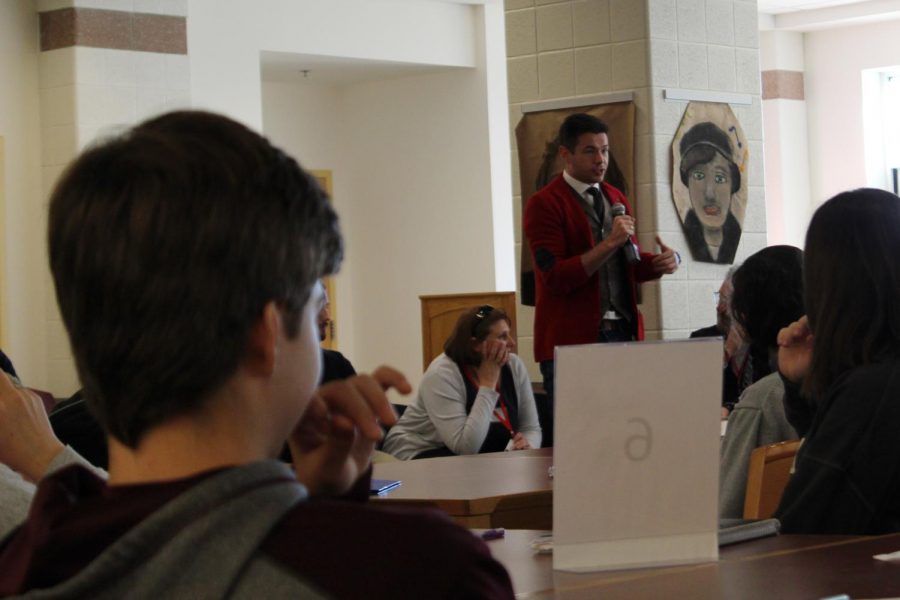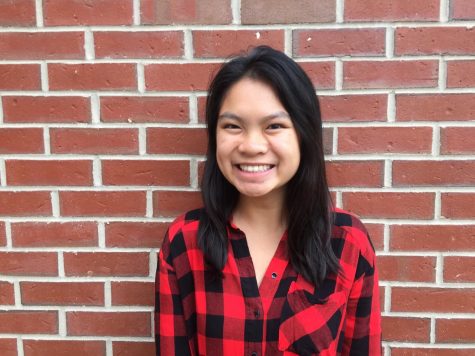International journalists speak about media literacy
Students listen as a journalist from the International Visitor Leadership Program speaks in the library.
November 13, 2018
Eighteen international journalists observed and interacted with U.S. History I and Computer Essentials students as they participated in activities while learning about the First Amendment on October 26.
The visit concluded with a panel discussion where the journalists thoughtfully answered students’ questions concerning the importance of news and its role in the world, while offering their own questions for students to answer.
Ranging from countries like England to Moldova, the journalists were selected to be a part of the International Visitor Leadership Program, organized by the U.S. Department of State. The goals of the program include examining ways to foster a discerning audience of media consumers and exploring the rights and responsibilities of a nation that allows free press.
This program selected to visit Algonquin because of Computer Essentials teacher Catherine Griffin. She was one of the first to use Checkology, an online program run by the News Literacy Project and the Facebook Journalism Project that teaches students how to discern fact from fiction.
“Whenever they have something in the Boston area, [Checkology] reach out to me, and this visit was one of those opportunities,” Griffin said. “[The visit] went better than I could ever hope for. I was so proud of all the students for being open and honest with the journalists and showing maturity.”
The journalists observed all activities, eager to see how the press was highlighted in public schools and how it compared to their home countries.
“Compared to most of the European countries, basic human rights come a bit later, meaning there is much more emphasis on not only the freedom part, but on the part of responsibility,” Estonian Press Officer Harrys Puusepp said. “Here we see that freedom is overemphasized. In Europe, it’s sort of more balanced. You have all your freedoms, but at the same time, you have restrictions.”
Around 100 U.S. History I and Computer Essentials students gathered in the library. History students split up into separate groups and discussed different parts of the First Amendment, rotating every couple of minutes to explore a different part. Computer Essentials students continued with the Checkology assignment they had been working on in class.
“I started [using Checkology] because I knew there was a need for students to be more educated,” Computer Essentials teacher Catherine Griffin said. “They’re constantly bombarded with digital information and they really need to be more educated about what they are reading online.”
The last half hour was comprised of a Q&A session, and at first there was hesitance from the students. However, that soon disappeared once the journalists themselves started asking questions for the students to answer. Questions included students’ opinions on being a journalist and what in the world concerns them the most.
By the end of the period, there was a long line of eager students waiting to ask questions. Some even stayed after the bell to receive answers.
“As an educator, the most rewarding thing was to see kids take the opportunity and stand up in front of their peers and ask some really difficult questions of these journalists and, in turn, have journalists ask them very difficult questions,” librarian Kimberly Honey said.
Freshman Ethan Connolly’s favorite part of this opportunity was hearing authentic answers from journalists and to put faces to people who put out news.
“I think [my favorite part] was to hear what they thought about everything and to hear their point of view compared to ours,” Connolly said. “We were genuinely asking ‘What’s this like?’ and ‘How is it different?’ They answered that they can’t always say everything and how reporters are dying and how their job is actually dangerous and sometimes life threatening. That was extremely interesting to hear.”
Griffin hopes this unique opportunity will not only prove beneficial in the classroom, but also in the future as students gain a different perspective and cultural awareness.
“We’re trying to make global citizens,” Griffin said. “Students are going to be voting and we want to show them that there is a whole world outside of Algonquin. To see the students line up and reach out to the journalists and ask questions showed me that students bring hope for the future.”










